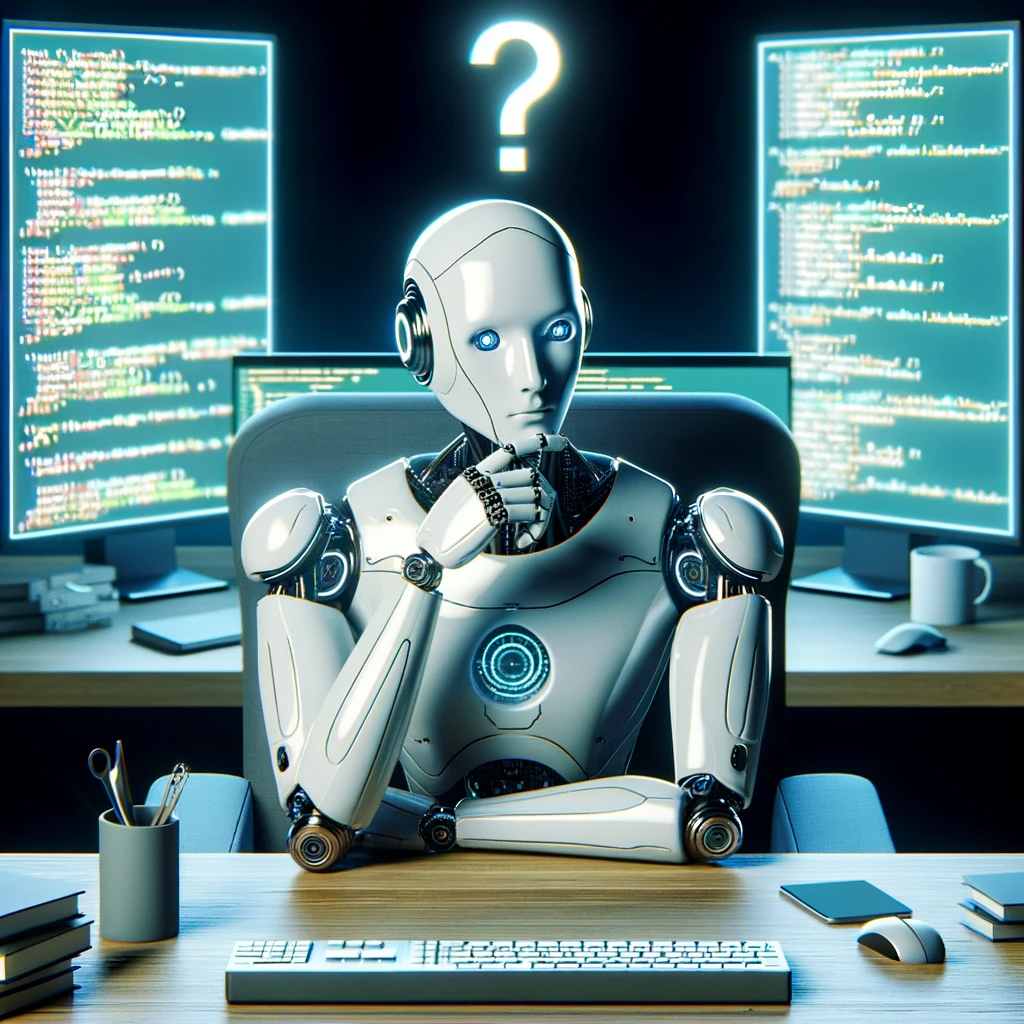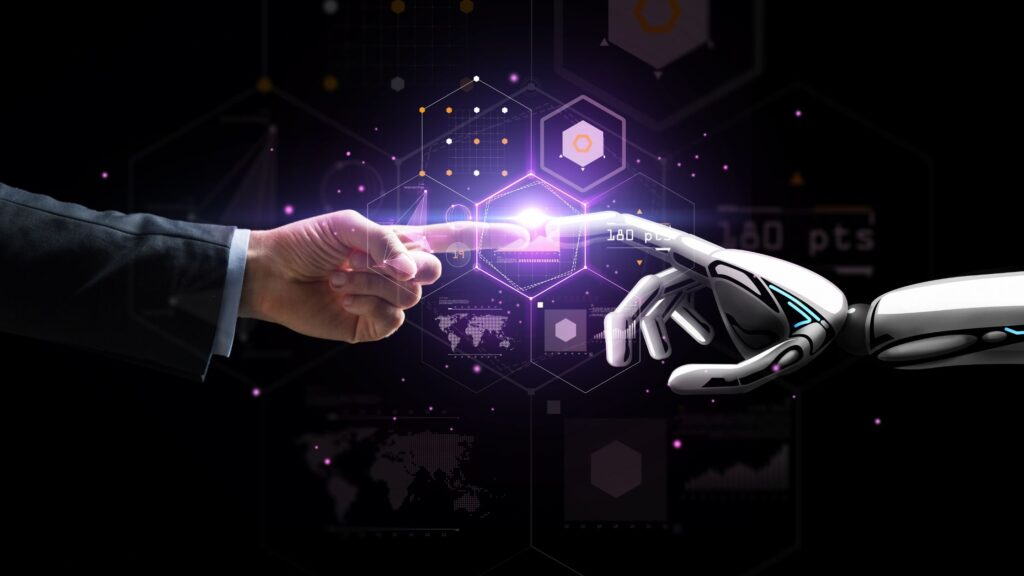Artificial intelligence (AI) is transforming industries across the board. As AI capabilities advance to emulate select elements of human intelligence, fears of sweeping workforce displacement inevitably arise. In particular, there are growing questions about AI automation stealing software development or programming jobs.
This article looks at the key indicators shaping AI’s emerging influence on programming roles and skills demands to determine the extent of human job risks. So if you are wondering whether AI will replace programmers or software developers, you are at the right place.

AI’s Current Capabilities in Programming?
Before evaluating AI’s potential to replace programmers, it’s vital to understand the current role of AI in programming.
1. Automating Mundane Coding Tasks
AI excels at pattern matching and repetitive executions once trained with sample data. This makes AI perfectly suited to automate low-complexity coding work.
Rote activities AI can reliably shoulder for programmers include:
I. Code Generation
AI-powered tools can assist programmers by generating code snippets or even entire programs based on specifications and patterns. This aids in automating repetitive coding tasks, saving time, and reducing the likelihood of human errors.
II. Bug Detection and Debugging
AI algorithms can identify and highlight potential bugs and vulnerabilities in code. Automated bug detection tools can analyze code for common issues, improving code quality and reducing debugging time.
III. Code Optimization
AI tools can analyze existing code and suggest improvements to enhance performance, reduce resource usage, and make code more efficient. This is particularly valuable for large and complex software projects.
IV. Automated Testing
AI can automate the testing process by generating test cases, executing them, and identifying issues in the code. This not only accelerates testing but also helps maintain software quality.
Relieving programmers from manually grinding through such mundane tasks amplifies their productivity manifold.
2. Accelerating Time to Market
Another major benefit of integrating AI coding assistants is faster output generation through automation. Code creation today forms bottlenecks delaying application build and deployment cycles.
By offloading initial rounds of routine drafting and revisions to AI tools, programmers regain creative bandwidth to focus exclusively on complex solutions.
This allows for significantly shrinking development timelines and accelerating product launches.
3. Making Programming More Intuitive
Mastering software languages demands tremendous investment of time and mental rigor even for experienced coders. AI is stepping in to simplify programming itself through:
- Code generation via conversational interfaces rather than forcing syntax mastery
- Embedded machine learning that handles complexity without explicit rules
- Recommender systems surfacing best approaches for context
Such innovations lower the skill barriers by minimizing the learning curves, enabling more inclusive and intuitive coding.
The above factors underscore AI’s definite potential to transform programmer effectiveness. But will these productivity enhancements expand professional opportunities or destabilize jobs?
Evaluating the Risk of AI Replacing Programmers
In my opinion, the risks of AI wiping out entire occupations get overplayed given most automation simply changes the relative mix of required human skills rather than outright human replacement.
Several key characteristics still position programming roles to grow despite AI stepping in:
1. Increasing Software Volumes Demand More Programmers
As modern life digitizes exponentially across domains, the applications and software backend this relies on are ballooning as well. Programmer resources are already overstretched catering to unrelenting market needs.
It’s estimated over 25 million new developer roles will emerge industry-wide in just the United States between 2016 and 2026. Such an expansive demand backdrop offers insulation from redundancies despite automation.
2. Evolving Programming Complexity Requires Human Judgment
The multiplying layers of services, platforms, data, and connectivity protocols are complicating software environments enormously. This requires sharpened discernment to optimize application performance and security.
Nuanced judgment for decision variables like:
- Integrating end-to-end workflows
- Mapping complex system interactions
- Securing distributed solutions
- Optimizing technology configurations
- Localizing for languages and cultures
defies AI given a narrow computational focus on specific task automation. Only human programmers possess the versatility needed for multifaceted analysis essential for holistic next-gen programming.
3. Constant Reskilling Reduces Threats
Programming has always mandated relentless upskilling whether through new languages, changing frameworks, or augmented reality interfaces. Developers continually revamp capabilities throughout their careers.
This ingrained modernization enables smoothly gaining competencies for collaborating with AI tools compared to roles with static skill demands being abruptly automated.
4. Advance Tools Have Consistently Upskilled Programmers
Established developer tools like compilers, debuggers, and IDEs already automate parts of app building without downsizing programmer headcount. In fact, it is something that has only grown hitherto.
AI can simply be regarded as the next technology wave empowering individuals to accomplish more instead of substituting them. So will AI replace programmers? Most likely not, at least not in the near future.
Just as past innovations that eased coding Complexity expanded possibilities, AI too will elevate human programmers rather than endangering livelihoods.
Also Read: How much Cloud Storage do I really need?
5. Other Limitations of AI in Programming
Creativity and Problem Solving
AI struggles with tasks requiring creativity and innovative problem-solving. While it can automate routine coding tasks, it cannot often devise novel solutions to complex problems. Maybe we will see such enhancements in the near future as that is the goal. But at this point, AI is not likely to replace programmers.
Context and Understanding
Understanding the broader context of software development, including user requirements and business goals, remains a challenge for AI. Human programmers excel in grasping the nuances of a project.
Ethical and Decision-Making Aspects
AI lacks the ethical and decision-making capabilities that human programmers possess. Also, despite the latest models such as GPT 4 being trained on billions of parameters, it still hallucinates. Meaning it portrays wrong information in a manner that feels right.
AI is still not developed enough and decisions related to project priorities, trade-offs, and ethical considerations require human judgment and values.
Also read: Amazons GPT55X - A hyped AI model which is merely an AI hallucination
The Skills Imperative for Programmers in an AI Future
Given the arguments above, AI seems unlikely to make programming jobs extinct. However, competency transitions remain vital to thrive in a machine collaboration paradigm. In other words, AI will not replace programmers but it will change the way we determine the competency of a programmer. Those who can include AI in their workflow would be the ones most likely to survive.
Here are key starter guidelines for programmers to sustain market relevance:
1. Embrace AI as an Augmenting Partner
View AI as powering up strengths rather than an adversary gunning for your career. Model its assistance potential for different project needs.
Just as learning new programming languages expands possibilities, adding AI to your toolkit multiplies problem-solving capacities manifold.
2. Strengthen Computational Thinking Abilities
While AI handles software creation mechanics, programmers must elevate skills for framing the strategic objectives and constraints to guide AI coding.
Sharpen key computational thinking muscles like:
- Defining problems precisely
- Mapping optimal step sequences
- Quality assurance mindset
- Locking reliability factors
This high-level oversight role leverages human creativity, emotion, and ethics essential for directing AI’s computerized narrowness toward customer-centric solutions. So, AI can’t currently replace programmers or developers.
3. Specialize in AI-Driven Software Architecting
Programmers skilled in intelligently stitching together modular microservices, data inputs, API endpoints, and cloud utilities to form coherent software systems will be in hot demand.
- Use AI assistance for component-level build
- Direct AI through setting architecture vision
- Continually optimize emergent solution performances
These AI software architecture capabilities require both human oversight and machine execution.
4. Master MLOps – ML Model Development Ops
With businesses increasingly dependent on Machine Learning models, programmers must grasp MLOps skills of rapidly building, monitoring, and maintaining reliable ML apps at scale using automation pipelines.
- Leverage AI for swift prototyping
- Implement MLOps for monitoring production ML apps
- Continuously improve model accuracy
These competencies optimize fruitful collaboration between machine learning and human programmers.
The above highlights how programmers must proactively reskill around AI collaboration to sustain fulfilling careers rather than risk being left behind.

Summarizing Whether AI Can Replace Programmers or Not
In the final analysis, here is a summary view of AI’s impact on programming roles:
- Augmentation not Replacement – AI will empower developers rather than wipe out jobs. New human-AI partnerships will expand solution capabilities.
- More Democratization – AI lowers dependencies on specialized knowledge making coding more accessible. This expands technical talent pools.
- Changing Skills Mix – Programmers should reskill on directing computational thinking, ML model oversight, and solution architecture. Technical upskilling has always been integral to developer careers as computing technologies rapidly evolve. AI merely represents the next skilling milestone.
- Net Job Creation – Surging digital transformation needs across healthcare, education, smart communities, etc. will spur massive demand for software innovation exceeding supply. AI boosts individual programmer productivity expanding capacity to fulfill market needs.
So rather than dread the marching inevitability of automation, programmers should gear up to actively integrate AI collaborators amplifying productivity and career horizons!
FAQs on AI’s Impact on Software Jobs
1. Will AI code replace computer programmers completely?
Unlikely. Compared to routinized manual jobs, programming requires multifaceted oversight AI lacks currently. Demand explosion also guarantees abundant roles. AI will instead assist programmers in multiplying output.
2. What parts of a programmer’s job can AI automate?
Testing, debugging, initial code drafting, platform migrations, and converting requirements into baseline prototypes are ideal for AI automation. This frees up coders for high-value strategizing.
3. How can programmers skill themselves to have an AI-augmented career?
Cultivate strengths in computational thinking, solution architecture, ML model development ops, and complementary management skills to direct AI coders optimally rather than compete with them.
4. Will AI cut software job availability and salaries?
No, expert projections estimate massive software job vacancies even factoring in AI automation. For example, India will face 10x more coding job openings than engineering graduates by 2025. Salaries may however polarize based on capabilities.
5. What is the best strategy programmers should adopt in the face of AI disruption?
Proactively build expertise in emerging competencies like MLOps, human-AI collaboration frameworks, and leveraging AI for prototyping instead of resisting automation which has repeatedly uplifted tech jobs hitherto.
In Summary
AI is transforming coding like previous innovations, by expanding possibilities rather than decimating jobs. The relationship between AI and programmers in the software development field is one of collaboration and augmentation. As AI continues to advance, programmers can use it to drive innovation and efficiency while retaining their crucial roles as architects of digital


